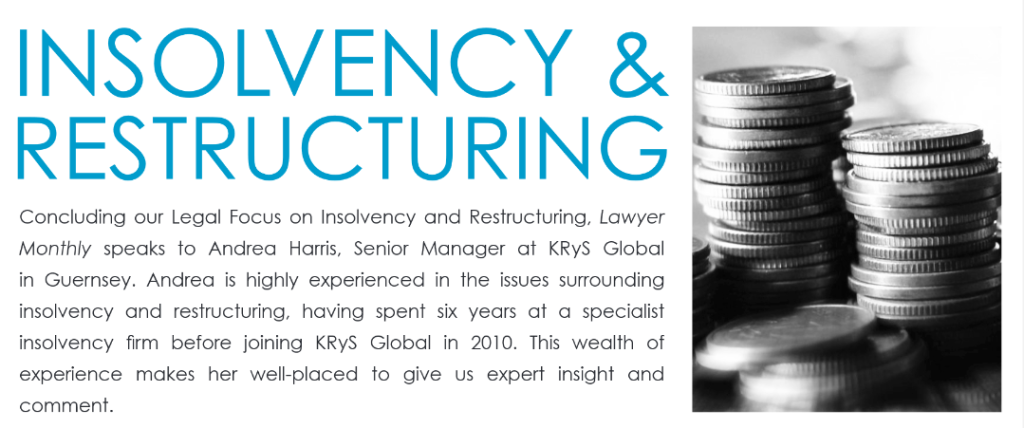Legal Focus – Insolvency and Restructuring

Q: Has the nature of insolvency and restructuring in Guernsey changed over the last 12 months at all?
There has been a continuing trend in relation to the liquidation of Guernsey domiciled property structures which hold assets in the UK. Changes to the UK tax regime have impacted the efficiency of holding property through an offshore structure, and clients are seeking to collapse these structures and transfer ownership directly to the ultimate beneficial owner. This has been achieved by utilising a solvent voluntary liquidation process whereby the assets of the subject entity are transferred to stakeholders by way of an in specie distribution.
KRyS Global has seen a major restructure brought about by a fraud perpetrated on the subject company, and by taking positions on the board of directors, we have been able to revive operations, and ensure the business continues as a going concern. The alternative of liquidation in that situation would have resulted in job losses, crystallisation of various contingent liabilities (which are mitigated by trading a going concern and reduce over time as the business continues to operate), termination payments, and breach of contract which would have rendered the company hopelessly insolvent. By undertaking a restructure, we have been able to not only salvage, but add value to, that entity.
We have also seen the use of liquidation proceedings in both solvent and insolvent situations where there are shareholder disputes, particularly in respect of how company funds have been utilised. The appointment of an impartial, third party liquidator to review a company’s records, transactions and undertakings is an efficient tool to provide a clear and decisive report to stakeholders.
Q: What strategies do you employ in order to recover assets?
Moving quickly is crucial. Whilst not technically defined as an “asset” of the subject company, books and records are sometimes the most important tool in respect of locating assets. Often, the books and records are located in various jurisdictions outside of the company’s domicile and care should be taken to recover these records as quickly as possible to enable the appointment to progress. Books and records enable an appointee to adequately investigate the company’s affairs and dealings. This is particularly important where a fraud has been perpetrated, as it facilitates the identification of assets, and helps the appointee move to locate and secure those assets.
Appointees need to be on the “front foot” when taking steps to secure assets such as bank accounts, real property and other tangible assets – for example, immediate correspondence with the financial institution at which a company bank account is held is imperative for gaining control of that asset. The very nature of offshore appointments can make it difficult for an appointee to gain access to assets. For example, whilst the appointment has been made in Guernsey, there might be a bank account located in the UK, or physical assets located in the US. A number of different strategies, including recognition of the appointment in a foreign jurisdiction, may be required to locate, secure and realise those assets for the benefit of stakeholders.
Q: What are the specific challenges of asset recovery within the jurisdictions you work across?
Recovering assets in cross-jurisdictional cases can be difficult due to the specifics and nuances of each applicable foreign jurisdiction’s legal regime. Thus, finding competent local legal counsel is of paramount importance to the liquidator, who relies on local counsel to assist in implementing strategies for investigations and recoveries.
Recognition is often used as a tool to gain access to information, and control of assets, in other jurisdictions outside of the subject entity’s domicile. Often a party in a foreign jurisdiction will refuse to comply with a request or demand from a Guernsey appointee claiming that the Guernsey proceeding is not recognised in that country. In those cases, recognition proceedings would be considered to then enable the appointee to realise the assets for the benefit of stakeholders. The challenge to making recognition work in the favour of the appointee is to understand what is required in the various jurisdictions to ensure an application for recognition is successful. It is also important to understand any potential negative repercussions which may directly result from obtaining recognition. Legal counsel also play an important role in this area, to enable appointees to understand the intricacies of local law.
We are seeing an increasing number of restructuring appointments that occur across a number of jurisdictions, many which are not native English-speaking. The language barrier can be an issue. When the language barrier cannot be addressed internally, it is important to engage with service providers (such as legal counsel) who have the applicable language skills to facilitate clear communications between parties.
Q: What would you say are the typical issues involved when you’re negotiating a financial solution for insolvency cases?
There are no such “typical issues” – every situation is different. One example comes to mind. We were involved with an entity that was part of a larger group restructuring. There were a number of subsidiaries located in various jurisdictions, all with differing solvency requirements and obligations placed on the directors in respect of personal civil and criminal liability. From a review of the financial statements for the group entities, it was identified that a financial re-engineering of the intercompany loans would benefit numerous parties in respect of solvency positions. Against this, some parties objected to the proposed method of resolving these issues, but after a reasoned negotiation with all parties, and agreement was reached which put a number of companies out of the danger zone. At the end of the day, negotiating a financial solution in liquidation and restricting scenarios is about understanding local issues, obtaining good legal advice, and thinking “outside the box.”
